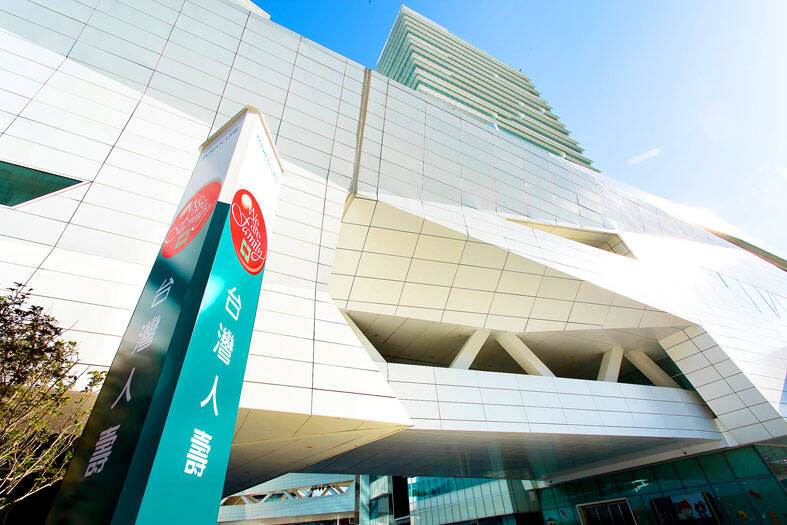CTBC Financial Holding Co (中信金控) yesterday said it has sufficient funds to pay cash dividends after booking unrealized losses of NT$90 billion (US$2.89 billion) from its life insurance arm, Taiwan Life Insurance Co (台灣人壽), thanks to strong profit growth from its banking unit CTBC Bank (中信銀行).
CTBC Bank is expected to post record net profit this year, CTBC Financial Holding president James Chen (陳佳文) told an investors’ conference.
In the first three quarters of this year, CTBC Bank’s net profits expanded 26.5 percent year-on-year to NT$28.9 billion, making up 90 percent of all net profits of the conglomerate, corporate data showed.

Photo courtesy of CTBC Financial Holding Co
Taiwan Life’s net profits plunged 77 percent annually to NT$5.15 billion due to compensation paid to COVID-19 insurance policy holders and an unrealized investment loss of NT$90 billion amid tumbling stock markets and volatile foreign exchange rates of the New Taiwan dollar versus the US dollar.
Asked about how the decline in net profit would affect CTBC Financial Holding’s cash dividend policy next year, Chen said that the company is seeking to pay out a dividend each year.
“Cash dividend distribution is still possible next year, although Taiwan Life might not be able to contribute significant earnings to the parent company,” Chen said.
“We mostly rely on the net earnings made by CTBC Bank to pay cash dividends. The bank performs quite well this year,” Chen said. “Moreover, CTBC Financial itself has accumulated retained earnings totaling about NT$100 billion, which could also be used for cash dividend distribution.”
CTBC Bank reported an annual net interest income increase of 26 percent to NT$19 billion last quarter, offsetting mild drops in its net fee income and investment returns, the data showed.
For the first three quarters of this year, the bank’s lending grew 17 percent to NT$3.12 trillion, with loans denominated in foreign currencies by its overseas units growing 27 percent from a year earlier, the most significant growth among its segments, the data showed.
Net interest margin, a common profit gauge for banks, last quarter continued to climb to 1.62 percent, up from 1.39 percent a year earlier, thanks to rate hikes by the central bank, the data showed.
Taiwan Life, the parent company of CTBC Insurance Co (中國信託產險), as of the end of September had set aside NT$14.3 billion to compensate policyholders of its COVID-19 insurance, which caused the life insurer’s profits to decline from a year earlier, it said.
However, Chen said COVID-19-related payments have nearly come to an end, and Taiwan Life has kept a satisfactory capital adequacy so far.
The life insurer does not have to raise fresh capital, he said.

Taiwan will prioritize the development of silicon photonics by taking advantage of its strength in the semiconductor industry to build another shield to protect the local economy, National Development Council (NDC) Minister Paul Liu (劉鏡清) said yesterday. Speaking at a meeting of the legislature’s Economics Committee, Liu said Taiwan already has the artificial intelligence (AI) industry as a shield, after the semiconductor industry, to safeguard the country, and is looking at new unique fields to build more economic shields. While Taiwan will further strengthen its existing shields, over the longer term, the country is determined to focus on such potential segments as

UNCERTAINTY: Innolux activated a stringent supply chain management mechanism, as it did during the COVID-19 pandemic, to ensure optimal inventory levels for customers Flat-panel display makers AUO Corp (友達) and Innolux Corp (群創) yesterday said that about 12 to 20 percent of their display business is at risk of potential US tariffs and that they would relocate production or shipment destinations to mitigate the levies’ effects. US tariffs would have a direct impact of US$200 million on AUO’s revenue, company chairman Paul Peng (彭雙浪) told reporters on the sidelines of the Touch Taiwan trade show in Taipei yesterday. That would make up about 12 percent of the company’s overall revenue. To cope with the tariff uncertainty, AUO plans to allocate its production to manufacturing facilities in

COLLABORATION: Given Taiwan’s key position in global supply chains, the US firm is discussing strategies with local partners and clients to deal with global uncertainties Advanced Micro Devices Inc (AMD) yesterday said it is meeting with local ecosystem partners, including Taiwan Semiconductor Manufacturing Co (TSMC, 台積電), to discuss strategies, including long-term manufacturing, to navigate uncertainties such as US tariffs, as Taiwan occupies an important position in global supply chains. AMD chief executive officer Lisa Su (蘇姿丰) told reporters that Taiwan is an important part of the chip designer’s ecosystem and she is discussing with partners and customers in Taiwan to forge strong collaborations on different areas during this critical period. AMD has just become the first artificial-intelligence (AI) server chip customer of TSMC to utilize its advanced

Chizuko Kimura has become the first female sushi chef in the world to win a Michelin star, fulfilling a promise she made to her dying husband to continue his legacy. The 54-year-old Japanese chef regained the Michelin star her late husband, Shunei Kimura, won three years ago for their Sushi Shunei restaurant in Paris. For Shunei Kimura, the star was a dream come true. However, the joy was short-lived. He died from cancer just three months later in June 2022. He was 65. The following year, the restaurant in the heart of Montmartre lost its star rating. Chizuko Kimura insisted that the new star is still down